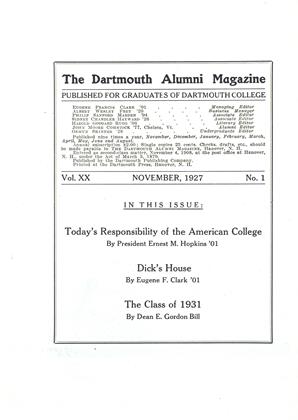The United States Circuit Court of Appeals for the Second Circuit met on May 2, 1927, in memory of Charles Merrill Hough '79 who died April 22, 1927. A meeting of Bench and Bar was held and various representatives of the Bar gave expression to their esteem and affection for Judge Hough. Those who spoke included Charles Evans Hughes, Drury W. Cooper, representing the Patent Bar, and Charles C. Burlingham, representing the Admiralty Bar. The addresses are contained in a memorial pamphlet, containing the minutes of the United States Circuit Court of Appeals for the Second Circuit and of the United States District Court for the Southern District of New York. The following is a part of the tribute of Mr. Hughes, speaking on behalf of the Bar of the United States Circuit Court of Appeals:
"Judge Hough was peculiarly equipped for his work, not simply because of his training as a practitioner, but because of his love of the study, his proficiency in the study, of the philosophy of the law. He was not content with formulas. His mind demanded an effort to penetrate beneath the crusts of reiterated statements. He grasped the evolution of the law, although his mind responded to its traditions. He was a philosopher on the Bench.
"Judge Hough was distinguished for his clarity of thought. He went directly, sometimes with a dazzling directness (dazzling to those following the more prosaic course of their own thought), to the heart of the problem. He was patient in everything that required deliberation but he had a noble impatience with respect to the immaterial.
"Judge Hough had a trenchant style. He did not sacrifice himself to the temptation of substituting a bon mot for a principle or (as he said, in one of his articles) of capturing epigrams in phrase-hunting, but he was able to state his thought in an arresting manner, so that while he exhibited the industry of a Judge, which the Bar always delights to observe, he had a way of putting his result which often was like a draught of fresh air blowing through the fetid atmosphere of the courtroom.
"Judge Hough realized to us in a striking degree the patriotic devotion of the Judge. I wish that this had fuller recognition from the community. The work of the judiciary seems so remote from the concerns that occupy men in the street (although it is vitally related to them) that they think often of Judges as men, net of like passions with themselves, not as men of sacrifice, still less as men of heroic mould. But I think if we could truly write the records of those who have devoted their lives to the institutions of the country, we should find as fine examples of fortitude, devotion and heroism in the lives of our Judges as in the lives of distinguished soldiers upon the battlefield in time of national crisis.
"The patient, constant toil of men ill-rewarded without opportunity even for the gain of popular applause, with an immense amount of drudgery, with intense application, guided always by the star of conscience,—that to my mind is the realization, in the highest sphere, of patriotic devotion to the institutions of our country.
"In honoring the memory of Judge Hough, while it is impossible at this time to recall with any detail his service in the many decisions in which he took part, we fitly recognize the commanding influence that he justly exercised by reason of his integrity, his fairness, his great ability in the decision of the problems before him.
"Now he has the highest of all distinctions in that his work has become a permanent part of the fabric of our civilization. Those who long to be remembered by having their names inscribed upon rolls of honor are cherishing an illusion. The time will come when even school children may be unable to recall the names of presidents of the United States. The honor is in the work. The reward is in the service.
"Judge Hough has joined the choir invisible of those immortal dead who live again in minds made better by their presence."
 View Full Issue
View Full Issue
More From This Issue
-
 Article
ArticleTODAY'S RESPONSIBILITY OF THE AMERICAN COLLEGE
November 1927 By President Ernest M. Hopkins -
 Article
ArticleDICK'S HOUSE
November 1927 By Eugene Francis Clark '01 -
 Lettter from the Editor
Lettter from the EditorEditorial Comment
November 1927 -
 Class Notes
Class NotesCLASS OF 1899
November 1927 By Louis P. Benezet -
 Article
ArticleTHE CLASS OF 1931
November 1927 By E. Gordon Bill -
 Class Notes
Class NotesCLASS OF 1911
November 1927 By Prof. Nathaniel G. Burleigh








